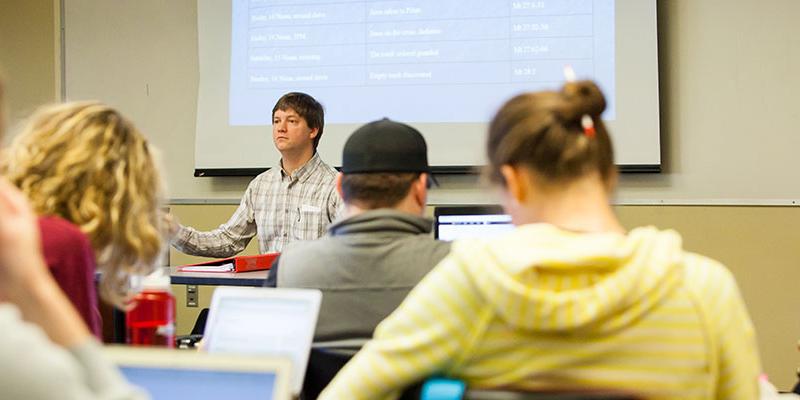
Core Program: A Liberal Arts Foundation Grounded in Spiritual Purpose
The Core Program provides the intellectual and spiritual foundation at Bryn Athyn College. It promotes broad intellectual inquiry and spiritual development through study in the liberal arts and religion. Guided by the College’s mission and framed by the spiritual teachings of Emanuel Swedenborg, the Core integrates diverse fields of knowledge and prepares students to engage responsibly in local and global communities.
Religious Instruction and Outlook
The central requirement of 18 credits of religious instruction supports students’ education in all other areas. These courses include an exposure to essential New Church doctrines, and enforce skills in communication, analytical thinking, and information literacy.
The impact of New Church teachings on the Core Program involves more than just religion courses. In support of our mission to enhance students’ civil, moral, and spiritual lives, the Core requirements include 6 credits of courses with a primary focus on civil or moral thought.
Liberal Arts Perspectives
The College’s mission statement articulates the achievement of a liberal arts education with special attention to spiritual, moral, and civil life. Traditional liberal arts requirements expose students to studies of human life in relation to God, society, nature, and self. With this foundation, students will be equipped to make informed and empowered choices in their lives.
Liberal Arts Core Skills
We emphasize the development of skills in keeping with New Church teachings about the importance of contributing positively to society. We are supported in this effort by accrediting agencies and advisory associations, such as the Association of American Colleges and Universities, that encourage institutions to make skill development and assessment a priority. The Middle States Commission on Higher Education emphasizes that an accredited institution’s curriculum needs to develop students’ proficiency in general education and essential skills, including “oral and written communication, scientific and quantitative reasoning, critical analysis and reasoning, technological competency, and information literacy. Consistent with mission, the general education program also includes the study of values, ethics, and diverse perspectives”. Furthermore, this education program should offer “sufficient scope to draw students into new areas of intellectual experience, expanding their cultural and global awareness and cultural sensitivity, and preparing them to make well-reasoned judgments outside as well as within their academic field” (Standards for Accreditation and Requirements of Affiliation (14th edition), Standard V Criterion 5).
Communication
Clear and thoughtful communication is essential to scholarly work and civic life. Through writing and public presentation, students learn to formulate questions, sustain an argument with evidence, and communicate ideas in both academic and public settings. Additionally, students develop information literacy: they will learn to locate, evaluate and use information effectively.
Humanities
Students study human creativity, history, and ideas to encounter perennial questions about truth, beauty, and a life well lived.
Social Sciences
Students examine how people and societies interact, exploring civic participation, institutions, and human behavior in local and global contexts.
Global & Cultural Awareness
Students engage diverse cultures and perspectives—through approved courses or language study—to recognize common human experiences and meaningful differences.
Natural Sciences
Students practice scientific reasoning and investigate the natural world, connecting empirical observation with questions of stewardship and use.
Mathematics & Computer Science
Students strengthen quantitative reasoning and problem-solving, using formal and computational methods to analyze patterns, uncertainty, and structure.
Additional skills developed within the majors
Ethics and technology are also crucial components of our Core Program and are addressed in specific ways by each major, with appropriate applications for particular disciplines.
Our Core Program can serve by:
- Teaching you to think broadly and critically from a number of perspectives.
- Helping you develop spiritual purpose through religious instruction and outlook.
- Guided reflection on moral, civic, and spiritual questions.
- Preparation for advanced study, professional pathways, and a useful life.